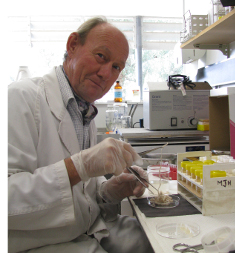 Charles
Sturt University (CSU) research has shown for the first time that foxes are a
host for the sheep measles parasite which costs the industry several million dollars
each year.
Charles
Sturt University (CSU) research has shown for the first time that foxes are a
host for the sheep measles parasite which costs the industry several million dollars
each year.
The finding suggests the current practice of worming domestic dogs is not enough to protect sheep from the parasite.
CSU parasitologist Dr David Jenkins, from CSU's School of Animal and Veterinary Sciences, conducted the research with Bachelor of Animal Science (Honours) student Mr Thomas Williams. He has called for the commercialisation of a vaccine to prevent sheep measles.
"Sheep become infected through accidentally eating the tapeworm Taenia ovis eggs while grazing," said Dr Jenkins. "These eggs hatch in their intestine releasing microscopic parasites that grow into sheep measles cysts in the muscles."
Sheep measles does not pose a problem for public health but Dr Jenkins said downgraded and condemned meat is a significant cost for abattoirs and a potential trade barrier.
The two-year study, though the Graham Centre for Agricultural Innovation and funded by Meat and Livestock Australia, examined the role of domestic dogs, foxes and wild dogs in the spread of sheep measles.
"We looked at several hundred domestic dogs and we didn't find one infected with the Taenia ovis on mainland Australia and only one in Tasmania," he said. "Given that sheep measles is common in slaughtered sheep from all areas of Australia it suggests sheep are being exposed to the parasite by something other than domestic dogs."
Using new molecular techniques for identifying infection the researchers examined fox carcasses collected through vertebrate pest control programs and recreational shooters in NSW and WA.
"We're roughly looking at about one per cent of foxes infected with this parasite in certain areas. Although it doesn't sound like very many if you consider that the eggs remain infective for at least 300 days the odds are stacked in favour of the parasite being transmitted," said Dr Jenkins.
"This is important because foxes are everywhere and in the high rainfall sheep producing areas of eastern Australia there can be a density of up to eight foxes per square kilometre."
Dr Jenkins said while it was clear that wild dogs had been eating sheep through the presence of other tapeworm species in their intestines there was no evidence of the Taenia ovis parasite in the 52 wild dogs examined.
"We still have to ensure that domestic dogs are wormed and fed safe products but this research has shown that there's a need to consider protecting the sheep from the spread of the infection by foxes," he said.
Dr Jenkins said a vaccine developed in 1989 has been shown to be effective against sheep measles but it has never been registered for use in Australia.
"Most of the commercial losses from sheep measles are borne by the processors so the vaccine would need to be marketed so that farmers want to use it," he said. "There needs to be co-operation between all sectors of the industry and research funding to get this vaccine to a stage where it can be registered for use in Australia."
Dr Jenkins' research has been published online in The International Journal for Parasitology: Parasites and Wildlife.
Listen to Dr Jenkins here.





Social
Explore the world of social